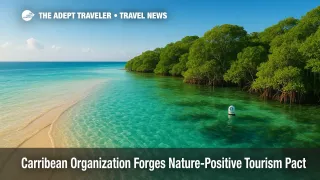CTO, Conservation International Forge Nature-Positive Tourism Pact

The Caribbean Tourism Organization (CTO) and global nonprofit Conservation International (CI) have signed a two-year memorandum of understanding that puts nature-positive tourism at the center of the region's growth strategy. Signed June 11 at CTO headquarters in Barbados and announced publicly on July 22, the agreement aligns tourism revenue with ecosystem protection, community well-being, and climate resilience.
Key Points
- Why it matters: Tourism supports one in five Caribbean jobs, yet unchecked growth strains fragile ecosystems.
- Two-year MOU prioritizes mangrove, reef, and coastal restoration projects that also generate visitor experiences.
- Plan builds local capacity through training, data sharing, and grants for community-led nature tours.
- CI will mobilize private capital to scale "blue-economy" ventures and biodiversity offsets.
- Framework supports CTO's Reimagine 2025-2027 plan for regenerative, inclusive growth.
Snapshot
The Caribbean's US $50 billion tourism engine relies on beaches, reefs, and rainforests that are increasingly threatened by coastal development, warming seas, and storms. By linking visitor spending directly to conservation outcomes-such as reef nurseries, mangrove buffers, and low-impact excursions-the CTO-CI accord aims to convert natural capital into a long-term economic asset. CI's science teams will map high-value habitats, while CTO will embed sustainability metrics in marketing and training for its 25 member destinations.
Background
Momentum toward "regenerative" travel has accelerated since the pandemic, as travelers demand authentic, low-footprint experiences and governments seek climate-smart recovery. The Caribbean already hosts small-scale turtle-watching, coral-gardening, and agro-tourism programs, but funding and coordination have been uneven. CTO's Reimagine roadmap highlighted the need for a unifying partner with scientific depth and finance links-roles CI has filled in Indonesia, Fiji, and Costa Rica. The new pact channels lessons from those regions into standardized guidelines, impact-monitoring tools, and blended-finance models tailored to island economies.
Latest Developments
Community-First Conservation Funding
Over the next 18 months, CTO and CI will pilot a grant window that diverts up to 2 percent of participating hotels' room revenue into local conservation trusts. Projects eligible for the first funding round include reef-safe mooring fields in Grenada, mangrove restoration in Tobago, and cultural heritage trails in Dominica. CI will match private contributions with philanthropic capital and provide monitoring protocols that track biodiversity gains alongside visitor satisfaction scores. Successful pilots could unlock carbon-credit revenue streams by 2027, creating a self-reinforcing cycle of conservation and economic uplift.
Analysis
The CTO-CI agreement is more than green branding-it is a structural shift that rewires how tourism wealth flows through island economies. By mandating measurable ecological returns and community dividends, the pact tackles three chronic weaknesses: dependence on imported goods, leakage of profits abroad, and vulnerability to climate shocks. Embedding nature-positive metrics into marketing and investor pitches can also reposition the Caribbean in an increasingly competitive global market where travelers scrutinize sustainability claims. Challenges remain: harmonizing standards across jurisdictions, securing buy-in from large resort chains, and safeguarding transparency in fund management. Yet CI's track record with Blue Nature Alliance and other seascape programs suggests the tools exist. If the pilots prove financially attractive, they could crowd in green-bond investors and multilateral climate funds, giving the region a scalable blueprint for balancing growth with stewardship.
Final Thoughts
The CTO-Conservation International partnership signals a decisive move toward nature-positive tourism in the Caribbean. Success will hinge on transparent metrics, local ownership, and the ability to translate ecological gains into resilient incomes. Done right, the initiative could make the region a benchmark for regenerative travel worldwide-where thriving reefs, healthy communities, and profitable visitor experiences coexist.
